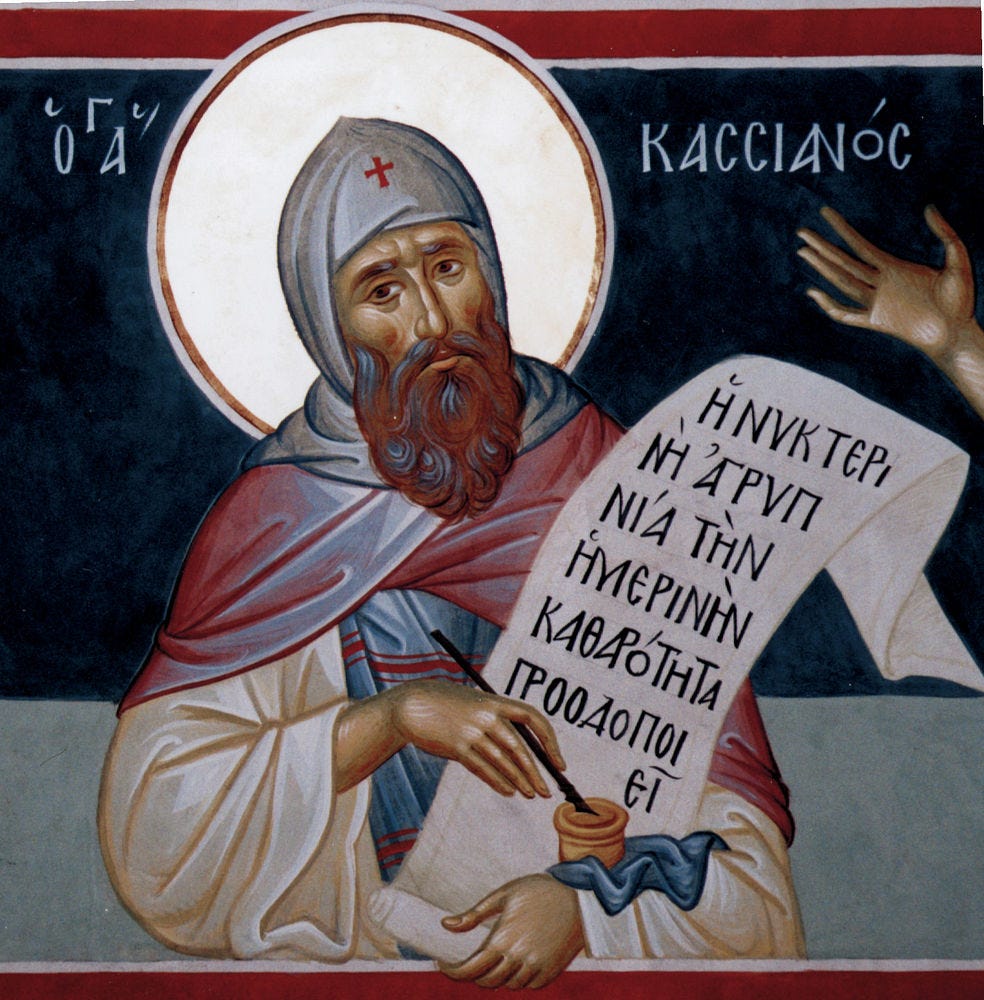How to Read the Holy Fathers This Lent!
w/ Fr. Joseph Lucas + Tips on Approaching Monastic Literature (i.e. Desert Fathers, Conferences, Divine Ascent, etc.)
Last week I shared a wonderful interview with Fr. Joseph Lucas on his new book, “How To Read the Holy Fathers: A Guide for Orthodox Christians.” This book is not just any kind of introduction to the church fathers but rather was written to specifically aid modern readers, particularly Orthodox Christians, on how to best interpret the different kinds of literature they produced such as letters, hymns, Biblical exegesis, pastoral homilies, apologetics, doctrinal treatises, liturgical commentaries, and ascetical works. Since Lenten Fast is now upon us, let’s focus on this last type of literature.
How To Read Ascetical ‘Lenten Literature’
I remember when I first began to read the desert fathers many years ago. It was like finding a mixture of gold and grey. They are gold, because they clearly point to Christ and becoming an authentic disciple of Him. The grey (or confusion) arrives when you are reading texts written by monastics primarily for monastics. The lifestyle of monks can be quite intense. How is a layperson with a large family supposed to live, pray and fast like a monk?!
This is where Fr. Joseph’s book becomes quite helpful. It is best to keep in mind two out comes for why we repent and fast: Humility and abiding in the Presence of God (or Kingdom of God).
In the popular work that Orthodox Christians read every Lent, The Ladder of Divine Ascent, a layperson asks an abbot how they can lead a prayerful life in God’s abiding presence? This is his reply:
“Some people living carelessly in the world have asked me: ‘We have wives and are beset with social cares, and how can we lead the solitary life?’ I replied to them: ‘Do all the good you can; do not speak evil of anyone; do not steal from anyone; do not lie to anyone; do not be arrogant towards anyone; do not hate any one; be sure you go to church; be compassionate to the needy; do not offend anyone; do not wreck another man’s domestic happiness;3 and be content with what your own wives can give you. If you behave in this way you will not be far from the Kingdom of Heaven.’” (See Lucas, pg. 176-180).
What is the actual goal of ascetical and monastic practices? It is to achieve true humility before God and others. Fr. Joseph Lucas writes,
“Another important theme in the Desert Father is that of humility. The word humility is derived from the Latin humus, referring to dirt. A humble person thus is on who descends down, like rain falling to the ground, thereby deflecting praise and emptying his or her soul of egotism and self-importance… The Desert Fathers exemplified this virtue, fleeing from pride as from the devil himself.” (see Lucas, pg. 172).
The most dangerous aspect of Lent is that we join in ‘the Fast of the Demons’ rather than than that of the Angels. The fallen angels do fast (do not eat) but forget to pray and become puffed up on pride. The Angels, on the other hand, are always praying and humbly abiding in the Presence of God.
Another misunderstanding of asceticism is that we are trying to ‘earn’ God’s favor and forgiveness through our own efforts in contrast to growing in His grace. Fr. Joseph points to St. Anthony the Great who reminds us that ‘pleasing God’ is about remembering 3 precepts.
“What must one do in order to please God"?” The old man replied, “Pay attention to what I tell you: whoever you may be, always have God before your eyes; whatever you do, do it according to the testimony of the Holy Scriptures; in whatever place you live, do not easily leave it. Keep these three precepts and you will be saved.” (See Lucas, page 175)
As I reflected on Abba Anthony’s words, I thought of a plant that can do nothing on its own but continually needs the sun and soil to grow heavenward.
“Always Have God before you.” Like a plant that reaches out to sun for its energies, we need true prayer that reaches out to God and participates in His divine energies. If we neglect God, we will be like a plant that withers without the light of the sun. It decays and dies in the darkness that engulfs it.
“Whatever place you live, do not easily leave it.” A plant does not fly like a bird, but instead needs to be rooted in the soil where it also receives life and nutrients. In many ways, our spiritual lives are like this… we need stability and a rootedness. We need the accountability and encouragement of a godly community as well as a spiritual father that guides and challenges us. It is easy for us to give up and move onto ‘greener pastures,’ but we should not ‘easily move.’ We need to grow deeper roots.
“Whatever you do, do it according to the testimony of the Holy Scriptures.” A thriving plant not only looks upward to the sun and downward into the soil, but it also relates to its eco-system at the horizontal level. In other words, there is a pattern of life in a forest in which the plant participates. This is why Christianity was first called ‘The Way’ in the Book of Acts. The ‘habits’ of Christ and the first Christians create a ‘habitat.’ Holy Orthodoxy remembers this habitat and challenges its members to conform itself to this pattern. It is not just about right belief (orthodoxy), but more importantly, right practice (orthopraxy) and holy living in accord with Apostolic Tradition. This is a defining mark of the One, Holy, Catholic, and Apostolic Church.
As we begin this Great Lent, let’s be mindful of these cautions by Fr. Joseph Lucas on how to read ascetical literature so that we can arrive to Pascha looking more like Christ rather than our ‘old selves.’
Be entirely His,
Kyle




Much appreciated insights and advice as Lent begins. Many thanks.
Excellent advice. Thank you!